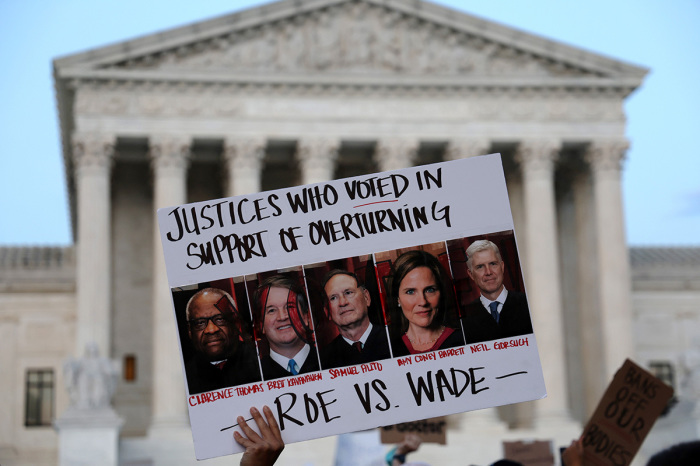House passes bill giving Supreme Court justices added security, 27 Democrats oppose it

The United States House of Representatives has passed a bill that would increase security for U.S. Supreme Court justices as tensions mount ahead of a ruling on a Mississippi abortion case after a man drove from California to Maryland with plans to assassinate Justice Brett Kavanaugh.
The Democrat-controlled House of Representatives overwhelmingly approved the Supreme Court Police Parity Act on Tuesday, more than five weeks after the Senate approved the bill unanimously. The legislation now awaits a signature from President Joe Biden.
The bill expands police protection to “any member of the immediate family of the Chief Justice, any Associate Justice, or any officer of the Supreme Court if the Marshal determines such protection is necessary.” A total of 396 members of the House voted for the measure, while 27 opposed it. All of the “no” votes came from Democrats.
While most of the opposition to the Supreme Court Police Parity Act came from the most progressive members of the Democratic Party, including the group of lawmakers known as “the Squad,” a group of six Democrats representing New Jersey voted against the measure as well. One of the lawmakers, Rep. Tom Malinowski, represents a swing district that political handicappers such as the Cook Political Report and the University of Virginia Center Politics predict will flip to Republicans in the 2022 midterm elections.
Two others, Reps. Josh Gottheimer and Mikie Sherrill, represent districts that the handicappers anticipate could become competitive if the political environment continues to deteriorate for Democrats. The three lawmakers representing very or somewhat competitive districts, along with Reps. Bill Pascrell, Albio Sires and Bonnie Watson Coleman issued a joint statement elaborating on their decision to vote against the bill.
“We fully support expanding security for Supreme Court Justices and their families. We also firmly believe that those expanded protections should also apply to federal judges and their families, who face similar threats, with less protective resources,” they said. “We stood alongside our friend Judge Esther Salas and voted no today because we could not support passing legislation that continues to ignore the pleas of all federal judges for greater security.”
As the lawmakers explained, “On July 19, 2020, a man who had appeared before Judge Esther Salas in her court came to her door dressed as a FedEx delivery man” after finding her address “with an easy online search.” The 20-year-old son of the federal judge who sits on the U.S. District Court for the District of New Jersey “answered the door of her home and was shot 3 times and killed” while “her husband was shot and is still recovering.”
The push to pass the Supreme Court Police Parity Act in the House follows the thwarting of an assassination attempt on Kavanaugh last week. Nicholas Roske of Simi Valley, California, showed up in the middle of the night outside Kavanaugh’s home in Chevy Chase, Maryland, armed with multiple weapons including a gun, knife and pepper spray. He called 911 before he could follow through with his plans and was arrested shortly thereafter.
The Washington Post reported that Roske texted his sister after expressing concern about the presence of U.S. marshals outside Kavanaugh’s home and she convinced him to call 911 and turn himself in. A federal grand jury indicted Roske for the attempted murder of a Supreme Court justice Wednesday and he now faces a maximum sentence of life in prison.
The safety of Supreme Court justices has become an increasing concern following Politico’s publication of a draft opinion in the case of Dobbs v. Jackson Women’s Health on May 2. The draft opinion reveals that a majority of Supreme Court justices, including Kavanaugh, have expressed support for overturning the 1973 Roe v. Wade decision that legalized abortion nationwide.
The prospect of overturning Roe has led to outrage among pro-abortion activists that has turned violent in some cases. Roske cited concern about the overturning of Roe as the motive for his assassination attempt.
In the days following the publication of the Dobbs draft, the pro-abortion group Ruth Sent Us published the home addresses of the six justices appointed by Republican presidents, five of whom signed on to the draft opinion. The group has illegally held protests outside the homes of the six justices on a weekly basis.
A final decision in the Dobbs case is expected by the end of the month. If the Supreme Court overturns Roe as expected, the issue of abortion will be decided on a state-by-state basis. While 21 states will either ban or restrict abortion more severely than they do right now in the absence of Roe, 16 states will continue to allow abortion throughout most or all of pregnancy because the right to abortion has been codified into state law.
An additional 10 states will likely continue to enforce existing abortion laws and/or restrictions and the remaining three could put abortion policy in the hands of voters in the form of ballot referendums.
Ryan Foley is a reporter for The Christian Post. He can be reached at: ryan.foley@christianpost.com




























